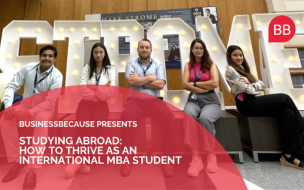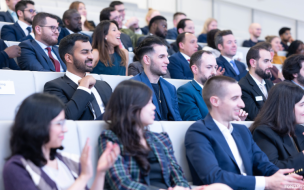Why Prague? Designed to provide students with the skills to conduct business on an international scale, the Lancaster MBA’s International Business in Context week in Prague takes students on a deep-dive into a unique socioeconomic environment.
This year, MBA students were schooled on the historical background of the Czech Republic—its journey from Soviet-era communism to today’s democracy—by Jaroslav Halik of the University of Economics, Prague.
They met with Christoph Israng—German Ambassador to the Czech Republic and a Lancaster MBA alum—went wine-tasting, on brewery tours—the Czech Republic boasts the highest beer consumption rate per capita in the world—visited the Museum of Communism, as well as local entrepreneurs, and big-name firms like Coca-Cola and Skoda, a Czech success story.
Fun cultural experiences aside, the week in Prague has given a class-full of Lancaster MBA students a competitive advantage in their careers going forward.
BusinessBecause caught up with three Lancaster MBAs—past and present—to find out more.
Natalie Abad, MBA ‘18
A trained engineer, Natalie worked for her family business and big-name firms like L’Oréal and Sanofi at home in Panama before moving to the UK for her MBA. Post-MBA, she wants to start a new career in management consulting.
On the Prague trip…Every day was packed with activities. We visited a diverse range of companies. Of course, multinational giants such as Coca Cola and Skoda were part of the agenda. Nevertheless, my personal highlights were the visits to local entrepreneurs, who shared their stories, successes and learning experiences with us.
On her learnings…For me, the key takeaway was the understanding of how the Czech Republic managed to transform its economy in a just few decades. Even though the process was not perfect, it demonstrates the great level of leadership the Czechs possess.
This was highlighted in a lecture presented by Radek Špicar who, by the age of 25, had graduated from Cambridge and started a master’s at Georgetown University, but interrupted it to return to the Czech Republic and serve as its deputy minister for economic affairs.
On the future…After the Lancaster MBA, my plan is to work as a management consultant, helping family-run firms achieve sustainable success across generations.
My commercial awareness and consulting skillset has been further enhanced through my MBA studies, with modules in areas such as finance, economics and corporate strategy. The Lancaster MBA’s immersive personal development training helped me become more aware of myself, others, and how human interactions influence business decisions.
Lorena Arrese, MBA ‘18
Lorena decided to leave banking in her native Peru behind and pursue a full-time MBA abroad, together with her husband. After graduation, she aims to work for a multinational company in a digital strategy role.
On the Prague trip…We gained great insight into the Czech Republic’s history; from communism to non-violent revolution, privatization schemes during the 1990s, and finally democracy with an open market economy. Moreover, we learned about the current Czech economy and its consumer, marketing and retail trends.
Coca Cola showed us the upsides and downsides subsidiaries of international businesses face in their daily management; Skoda told us their success story as a Czech automotive company which went from becoming a state-owned business during communism to being acquired by Volkswagen.
We also realized how the beer industry is a unique asset for the country’s economy, how important beer is for Czech culture, and how proud Czechs are about having the best beer in the world!
On her learnings… The week in Prague gave me valuable insights into how a country’s culture—attitudes, beliefs and values—impacts the business environment. It showed me that being aware of, and adjusting to, culture is key when managing international companies or starting up a business in a foreign country.
On the future…Going forward, the Prague trip will be a reminder of how important it is for international businesses to understand the local context in which they are operating.
The Czech Republic actually offers great working opportunities since it’s a country which has been growing in the last years reaching an unemployment rate of 2.9% in 2017, the lowest in Europe. The government has also been investing strongly in education, making their workforce highly-skilled and positioning the country as an exceptional study destination.
Julien Donadio, MBA ‘17
Julien started his first business aged 21. He worked as a real estate entrepreneur across Eastern Europe before deciding to pursue an and transition into a finance corporate role. After completing his MBA, he took up an internship at HSBC.

Looking back on the International Business in Context week in Prague, he says the school’s unique choice of study destination typifies its forward-thinking approach…
Why Prague? It’s about the history. Half of the EU are former communist countries. It’s an important market and it’s growing.
If someone wants to stay in Europe post-MBA, it’s a very good idea to know what’s going on in these countries and how people there do business.
In the UK or France, you think before you do something. You do something because you’ve learned to do it in the past. In Eastern Europe, everything is much more intuitive. It’s a different way of doing business.
That’s why if you can take what you learn from the Lancaster MBA to do something in these countries, you will definitely have a competitive advantage.









